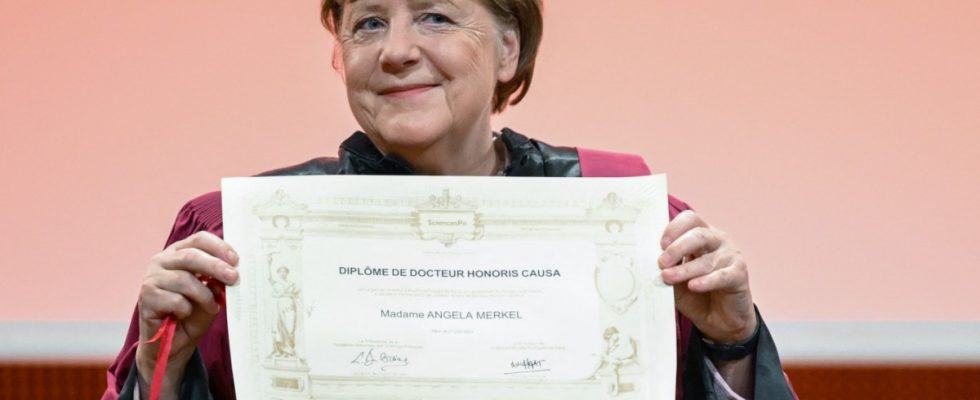There were several touching moments when Angela Merkel was awarded an honorary doctorate at Sciences Po in Paris on Tuesday evening. The most beautiful thing was probably the almost childlike joy of the laudator Laurence Bertrand Dorléac about the future plans of the former chancellor. So the long-famous Merkel sentences about thinking, reading a book, taking a nap and then seeing what happens next. In France, where the statesman always has to be a man of culture, that struck a chord. “It’s wonderful, it’s simple, it’s wise,” said Dorléac, president of the Fondation Nationale des Sciences Politiques, France’s top political scientist.
Merkel is often honored. But in Paris, at the heart of academia, in one of the most important political schools in the world, where all the French presidents she dealt with during her tenure – Jacques Chirac, Nicolas Sarkozy, François Hollande and Emmanuel Macron – studied, that is something special. Before Macron’s state visit to Germany next week and in view of the loud crunching between Paris and Berlin, the evening in the packed Amphithéâtre Émile Boutmy was not just a celebration of Franco-German relations. Merkel also managed to put the essence of her political thinking into words. Which in turn have something to do with France.
The university was founded in 1871 after France lost to Germany
Sciences Po, as the new director Mathias Vicherat pointed out in the introduction, has stood for particularly close Franco-German cooperation for decades. Here in St. Germain, a stone’s throw from the Prime Minister’s office, 700 young Germans are studying. Sciences Po has 27 partner universities in Germany, there are joint courses with Freie Universität Berlin or the Hertie School.
The École libre des sciences politiques came into being under “dark omens” (Vicherat): France’s defeat by Germany in the war of 1871. The university was founded to overcome this humiliation. Result of a feeling of inferiority. “Yes, Madam Chancellor,” said Vicherat ironically, “there was a time, very briefly, when the French felt an inferiority complex.”
Merkel reminds us of crises we have endured together
Merkel first thanked her with a look back at the German-French aspects of her life. Before 1989: nothing. Then: first contacts with intellectuals arranged by Helmut Kohl, during the chancellorship the crises suffered with the neighbors: EU constitution, euro, refugees, pandemic, war in Ukraine. All “examples of how joint Franco-German action has contributed to the well-being of Europe”.
And what makes up this Europe, what is its “soul”? Here Merkel stole, as she admitted, parts of a Merkel speech from 2007. It is the tolerance that is threatened from all sides that is only possible if you know something about the other person; when one can “see through the eyes of the other”. Which, in turn, enables one to “compromise,” the praise of which Merkel sang more fully than ever before. Joint action, German-French and European, is only possible thanks to such “agreements through mutual concessions”, in which the advantages outweigh the disadvantages for everyone. But concessions have to be made out of conviction and shouldn’t be viewed as defeat or even disgrace.
Alluding to speeches by Macron, whom she quoted several times, Merkel spoke of “untranslatability” and “ambiguity” as a special quality of European agreements. The “unconditional pursuit of complete clarity”, on the other hand, destroys the ability to compromise. Quite a few in the audience will have thought of the fundamental differences in interests that are currently driving Paris and Berlin apart, with regard to the euro, nuclear power and air defence. Despite all the vows of love, both sides find it very difficult to “see through the eyes of the other” – and to find compromises.
Almost casually, Arancha González, Dean of the School of International Affairs, ended her remarks with a big sentence: “Thank you for showing us the way.” Merkel reacted in a typical way, modest to the point of shyness. A vague wave, not a triumphant gesture. And sit back down quickly.

